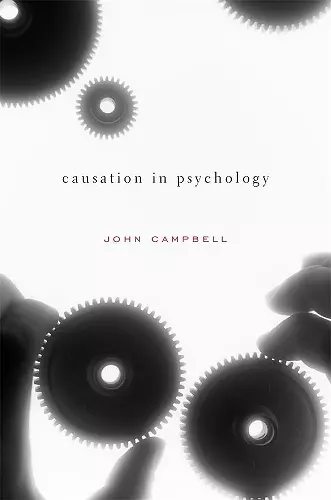Causation in Psychology
Format:Hardback
Publisher:Harvard University Press
Published:29th Jan '21
Should be back in stock very soon

A renowned philosopher argues that singular causation in the mind is not grounded in general patterns of causation, a claim on behalf of human distinctiveness, which has implications for the future of social robots.
A blab droid is a robot with a body shaped like a pizza box, a pair of treads, and a smiley face. Guided by an onboard video camera, it roams hotel lobbies and conference centers, asking questions in the voice of a seven-year-old. “Can you help me?” “What is the worst thing you’ve ever done?” “Who in the world do you love most?” People pour their hearts out in response.
This droid prompts the question of what we can hope from social robots. Might they provide humanlike friendship? Philosopher John Campbell doesn’t think so. He argues that, while a social robot can remember the details of a person’s history better than some spouses can, it cannot empathize with the human mind, because it lacks the faculty for thinking in terms of singular causation.
Causation in Psychology makes the case that singular causation is essential and unique to the human species. From the point of view of practical action, knowledge of what generally causes what is often all one needs. But humans are capable of more. We have a capacity to imagine singular causation. Unlike robots and nonhuman animals, we don’t have to rely on axioms about pain to know how ongoing suffering is affecting someone’s ability to make decisions, for example, and this knowledge is not a derivative of general rules. The capacity to imagine singular causation, Campbell contends, is a core element of human freedom and of the ability to empathize with human thoughts and feelings.
I found this book highly engaging. The parts about Karl Jaspers and social robots are packed with insights that will make you nod and smile. Campbell argues that singular causation in the mind cannot be analyzed in terms of general causation, but instead is brought to light by human practices that rely on our imaginative understanding of ‘the ballistics of people’s thoughts and feelings.’ These practices include attempts to reach legal verdicts beyond a reasonable doubt about people’s motives. The book is accessible, it discusses a range of long-standing philosophical problems about action and interpretation, and no one will drown in technical details. It’s simply fantastic. -- Susanna Siegel, Harvard University
There is a simplicity and directness with which John Campbell introduces and pursues material that has become cluttered and blocked in much philosophical discussion that has lost sight of the fundamental problems motivating such discussion in the first place. Causation in Psychology offers genuine, true solutions that should change the philosophical landscape for good. A fascinating, deeply original book. -- Bill Brewer, King’s College London
ISBN: 9780674967861
Dimensions: unknown
Weight: unknown
224 pages